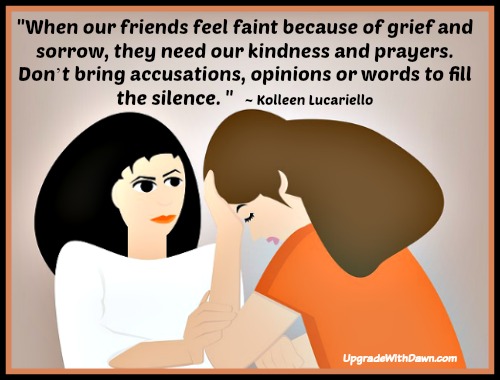When Words (Should) Fail You
Kolleen Lucariello's unique personality is a gift from God. She sees life through a different lens than most people. I love how—in this Communication UPGRADE—Kolleen challenges us to choose our words carefully, especially when facing a friend in grief.  "As soon as the words began to slip through my lips, I knew," Kolleen said.
"As soon as the words began to slip through my lips, I knew," Kolleen said.
"In my attempt to say the right thing to the father whose 37-year-old daughter had just passed away—I had failed. The tension was immense."
Sometimes I (Dawn) feel like I'm part of a not-so-special "club" of people who say the wrong things or the right things at the wrong time—even when they mean well. Kolleen apparently joined that club. But she's learning how to choose her words wisely and biblically, and she has wise counsel for all of us.
Kolleen continues . . .
My insides began to twist—as though a crank began to turn—followed by a conversation within my head.
“Kolleen, you need to apologize. Right now. Tell him you are sorry for asking an insensitive question.”
My apology was quick. Overcoming my embarrassment, however, was not.
Some words are just better left unsaid.
But there have been occasions when words roll off my tongue because of a nervous-need-to-fill-the-silence moment.
Sometimes, they fall out because of an insensitive-I-didn’t-think-first moment. Thankfully, I-don’t-care moments happen less often than they used to. But, in my attempt to offer the right words at that moment I missed the mark.
It’s not always easy to find the right words in the heat of someone’s hard moment.
Just ask Eliphaz, Bildad, and Zophar. They were three of Job’s friends who, in their desire to bring comfort to their friend, discovered their words had backfired.
Once known as the greatest, wealthiest, and most respected man in the east, Job had suffered through great loss (Job 1-2).
He was a changed man when his friends arrived that day. Sorrow and suffering can do that to you.
After hearing of his suffering, the three traveled to mourn with Job and comfort him (Job 2:11). When they arrived, their own grief took over when they found their friend unrecognizable (Job 2:12).
They did what good friends do.
They sat beside Job, and for seven days and seven nights no one said a word (Job 2:13). Silence. It’s a sacred, beautiful thing, but it can also be uncomfortable. Especially for someone who—like me—feels a heavy weight beneath too much silence.
When the sound of silence becomes too loud I, like Job’s friends, find myself speaking words out of uneasiness, rather than thought.
This is when the “fixer” in me rushes in to save the day, and do away with silence. Let’s find the reason, discover the cause, and then move on to the remedy.
But the words chosen may have a lasting effect on the one with whom I sit—and on me.
When Job broke the silence, and began to speak out of his heartbreak, his friends responded out of their “anxious thoughts” (20:2).
- Eliphaz wanted Job to understand he was being disciplined for his sin. "Consider the joy of those corrected by God! Do not despise the discipline of the Almighty when you sin" (Job 5:17 NLT).
- Bildad wanted Job to repent. His “If you…” statements cast blame on the man God described to Satan as blameless (2:3). “God will not cast away the blameless" (8:20). In other words, “You’re not so blameless after all, are you Job?”
- Zophar felt Job needed to be rebuked and reminded that God was punishing him far less than he deserved (11:6). Who needs to hear that when surrounded by sorrow and suffering.
Bring an Upgrade to the Life of Someone Suffering
1. Job’s friends did not recognize him in his time of grief.
Job had lost everything but his wife, and he was covered in grief and boils.
You may not recognize your friend in their time of sorrow and suffering. Sit with them amid the silence without trying to fix anything.
2. Job explained his heartbreak.
“If my misery could be weighed and my troubles be put on the scales, they would outweigh all the sands of the sea. That is why I spoke impulsively” (Job 6:1, NLT).
Friends in the midst of sorrow and suffering may speak impulsively. Grief isn’t always expressed neatly, or nicely. Let them speak without patrolling their every word.
3. Don’t jump to conclusions on why this is happening.
Job said, “Stop assuming my guilt” (6:29).
Before Job entered into this test God described him as "blameless"—a man of complete integrity (Job 1:8).
At the end of the test, each friend had been rebuked by the Lord. Job was the only one God said spoke accurately of Him. In their need to fill the silence with opinion, the friends spoke inaccurate assumptions (Job 42:7).
“One should be kind to a fainting friend, but you accuse me without any fear of the Almighty” (Job 6:14, NLT).
When our friends feel faint because of grief and sorrow, they need our kindness and prayers. Don’t bring accusations, opinions or words to fill the silence.
Find comfort in the silence.
 Kolleen Lucariello, #TheABCGirl, is the author of the devotional book, The ABC’s of Who God Says I Am and Co-Executive Director of Activ8Her, Inc. Kolleen and her
Kolleen Lucariello, #TheABCGirl, is the author of the devotional book, The ABC’s of Who God Says I Am and Co-Executive Director of Activ8Her, Inc. Kolleen and her  high school sweetheart, Pat, reside in Central New York. She’s a mother of three married children and Mimi to five incredible grandkids. She desires to help others find their identity in Christ, one letter at a time. Find out more about Kolleen here:
high school sweetheart, Pat, reside in Central New York. She’s a mother of three married children and Mimi to five incredible grandkids. She desires to help others find their identity in Christ, one letter at a time. Find out more about Kolleen here:
Graphic adapted, courtesy of Serena Wong at Pixabay.
 Post a Comment → Posted on
Post a Comment → Posted on  Tuesday, April 16, 2019 at 7:23AM
Tuesday, April 16, 2019 at 7:23AM  Accusations,
Accusations,  Counseling,
Counseling,  Grief,
Grief,  Kolleen Lucariello,
Kolleen Lucariello,  Opinions,
Opinions,  Sorrow,
Sorrow,  Upgrade with Dawn,
Upgrade with Dawn,  Wise Words,
Wise Words,  Words to the Grieving Upgrade Your Life
Words to the Grieving Upgrade Your Life  Communication
Communication 






